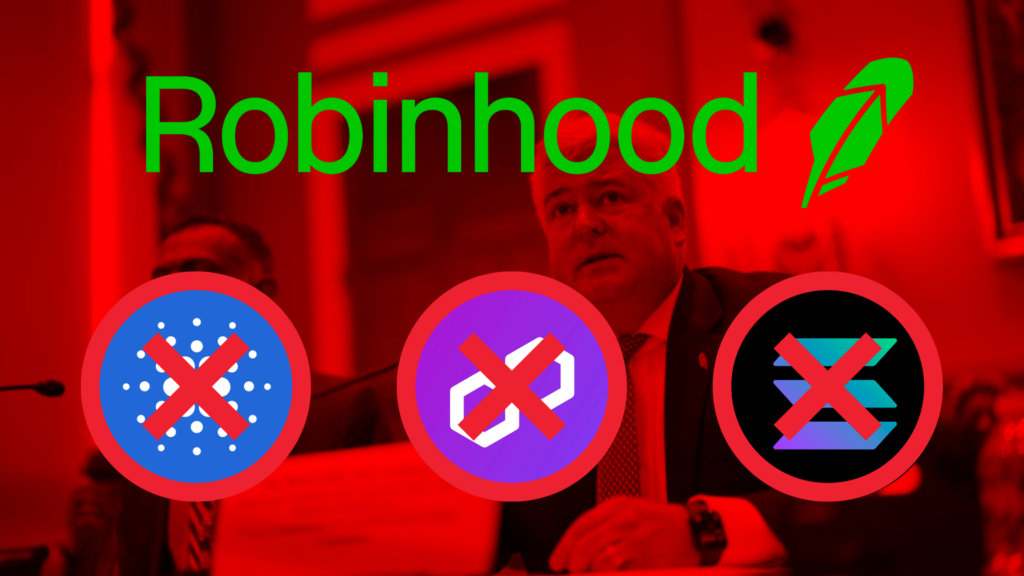
In a move that has raised eyebrows across the cryptocurrency industry, Robinhood Markets, the US-based financial services company, has announced the delisting of three major cryptocurrencies: Cardano (ADA), Polygon (MATIC), and Solana (SOL)1. This action comes in the wake of regulatory uncertainties in the United States, which have triggered a broader reassessment of cryptocurrency strategies among both companies and investors.
Behind the Delisting Decision
Robinhood’s decision to delist these cryptocurrencies is rooted in a series of actions taken by the U.S. Securities and Exchange Commission (SEC). The regulatory body has recently classified several tokens, including $SAND from Animoca Brands, as unregistered securities, leading to legal action against major crypto exchanges Binance and Coinbase2. The SEC’s central argument revolves around whether these tokens were used for fundraising and whether buyers anticipated a return on their investments2.
Among those affected by the SEC’s actions, Animoca Brands has opted to strategically shift its focus from the US market towards more dynamic markets in the Asia and the Middle East2. On the other hand, Coinbase CEO Brian Armstrong has affirmed that the platform will not delist the tokens named by the SEC, setting the stage for a legal battle over the classification of cryptocurrencies as securities2.
Robinhood’s decision to delist Cardano, Polygon, and Solana may be seen as a cautious response to these recent regulatory challenges. However, this move does raise questions about the future of cryptocurrency trading on the platform and the implications for other cryptocurrencies.
The Larger Regulatory Picture
The SEC’s lawsuits against Binance and Coinbase signal a high-stakes battle over the future of cryptocurrencies, extending its reach beyond U.S. borders and targeting a wider set of players3. This aggressive stance has not garnered widespread support within the US government, with some considering it a challenge to other bases of power3. A draft bill that aims to classify digital assets and limit the SEC’s interpretation of crypto within existing securities law is currently being discussed in Congress3.
The future of crypto regulation is also expected to become a key talking point in the upcoming presidential campaign, with three Presidential hopefuls already expressing their support for crypto3. The Supreme Court, under conservative control, might also play a role in reshaping the authority of regulatory agencies like the SEC3.
The Aftermath and Future
Following the SEC’s actions and Robinhood’s delisting decision, the price of $SAND, the token of Animoca Brands’ metaverse platform, The Sandbox, fell by 1.77%2. The impact on the prices of Cardano, Polygon, and Solana, and the broader crypto market, remains to be seen.
Robinhood’s decision underscores the regulatory uncertainty surrounding cryptocurrencies and its effects on the strategies of various players in the industry. The future of crypto regulation in the US is at a critical juncture, and the decisions made in the coming months could redefine the landscape of digital finance. For Robinhood and other platforms, the challenge lies in navigating this uncertainty while ensuring the interests of their users.
In the spirit of the cypherpunk ethos and the libertarian values that underpin much of the cryptocurrency world, it’s worth noting that these regulatory maneuvers by the SEC represent an interesting test for the decentralization and resilience that cryptocurrencies promise. As governments grapple with how to regulate this emerging field, the crypto community stands as a bastion of innovation, liberty, and resistance against centralized control.
The delisting of Cardano, Polygon, and Solana by Robinhood under regulatory pressure reminds us that the path towards a decentralized financial future is not without its hurdles. Yet, it also underscores the fact that the power of cryptocurrencies lies in their ability to operate outside traditional financial systems, offering a new paradigm of financial autonomy and privacy. In the words of the pioneers of this space, “We can’t stop Bitcoin; we can’t stop crypto. It’s like trying to stop the internet.”
As we navigate the turbulent waters of regulation, let’s not lose sight of the core principles that brought us here: financial independence, privacy, and decentralization. For every action of control, the decentralized nature of blockchain technology offers a reaction of resistance, pushing us closer to a world where financial power is distributed, not centralized, and where individuals, not institutions, control their financial destiny.
Join Our Newsletter
Subscribe to receive our latest updates in your inbox!
